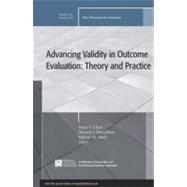
Note: Supplemental materials are not guaranteed with Rental or Used book purchases.
Purchase Benefits
What is included with this book?
1. Validity Frameworks for Outcome Evaluation (Huey T. Chen, Stewart I. Donaldson, Melvin M. Mark)
This chapter discusses the concept of validity as it applies to outcome evaluation and the contributions of the Campbellian validity typology, as well as related criticisms, and overviews the issue.
2. What Works for Whom, Where, Why, for What, and When? Using Evaluation Evidence to Take Action in Local Contexts (John Gargani, Stewart I. Donaldson)
After discussing limits of the Campbellian tradition regarding external validity, this chapter argues that the external validity of an evaluation could be enhanced by better addressing issues about what works for whom, where, why, for what, and when.
3. New (and Old) Directions for Validity Concerning Generalizability (Melvin M. Mark)
This chapter reviews several alternative framings of generalizability issues and provides potentially fruitful directions for enhancing external validity in outcome evaluation.
4. Criticisms of and an Alternative to the Shadish, Cook, and Campbell Validity Typology (Charles S. Reichardt)
This chapter presents four criticisms of the Shadish, Cook, and Campbell (2002) typology of validity. An alternative typology is proposed that avoids these criticisms.
5. Reframing Validity in Research and Evaluation: A Multidimensional, Systematic Model of Valid Inference (George Julnes)
A validity framework is described with three dimensions—representation (construct validity), causal inference (internal and external validity), and valuation.
6. Conflict of Interest and Campbellian Validity (Ernest R. House)
Problems related to bias due to researchers' intentional and unintentional manipulation are discussed, as are strategies for dealing with such problems and how they might be incorporated within the Campbellian validity tradition.
7. The Construct(ion) of Validity as Argument (Jennifer C. Greene)
This chapter presents an interpretive/constructivist perspective on outcome evaluation and on the warrants for our outcome-evaluation conclusions. It underscores the importance of developing warrants through argumentation, in addition to selected empirical evidence.
8. Assessing Program Outcomes From the Bottom-Up Approach: An Innovative Perspective to Outcome Evaluation (Huey T. Chen, Paul Garbe)
The authors argue that, to be stakeholder responsive, evaluation must apply an integrative validity model and a bottom-up approach to outcome evaluation to address both scientific and practical issues.
9. The Truth About Validity (William R. Shadish)
This chapter discusses the contribution of the chapters in the issue, including the extent to which they offer something new and provide justified arguments, and considers how discussions of validity might contribute productively to evaluation theory and practice.
INDEX.
The New copy of this book will include any supplemental materials advertised. Please check the title of the book to determine if it should include any access cards, study guides, lab manuals, CDs, etc.
The Used, Rental and eBook copies of this book are not guaranteed to include any supplemental materials. Typically, only the book itself is included. This is true even if the title states it includes any access cards, study guides, lab manuals, CDs, etc.